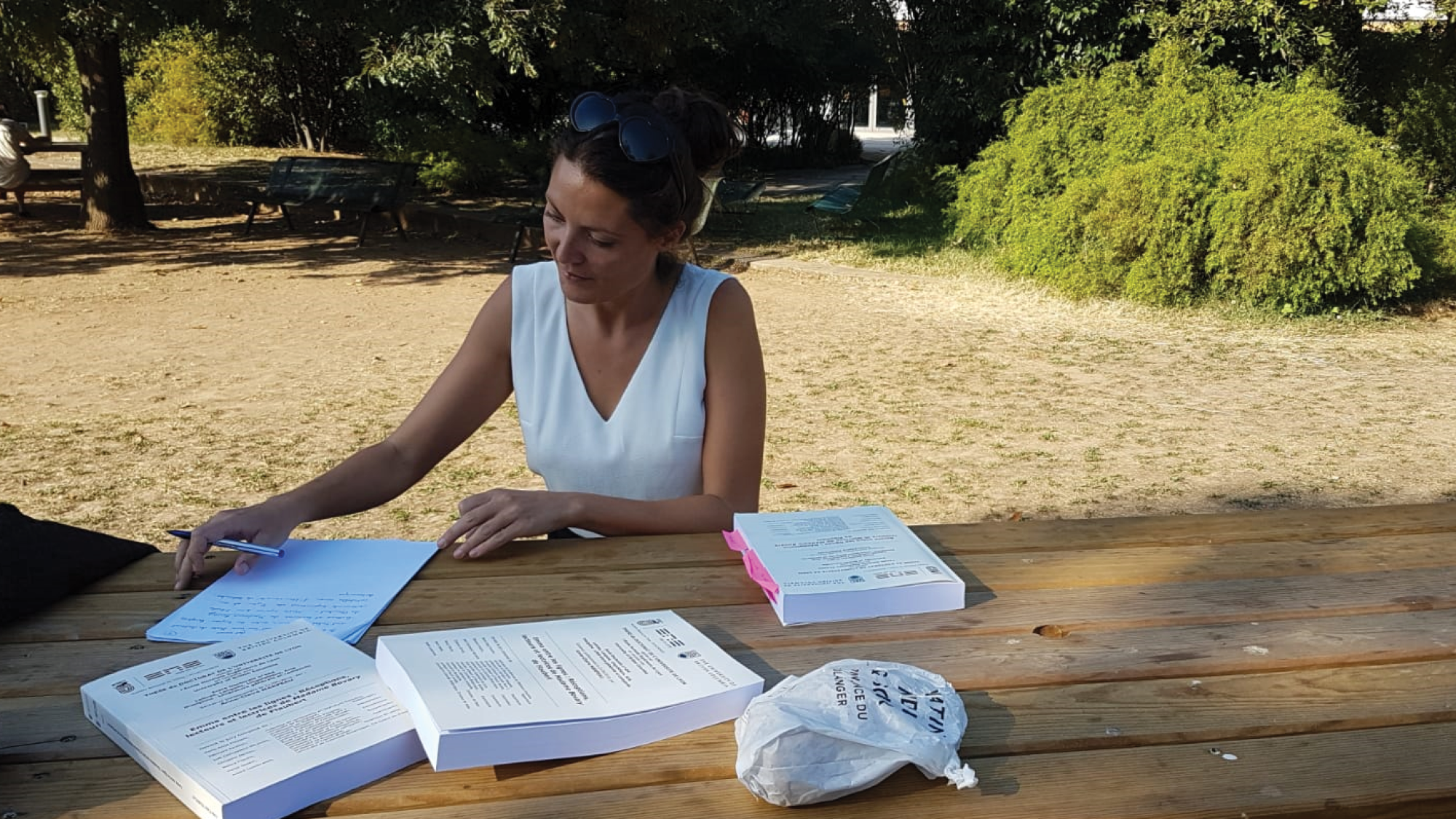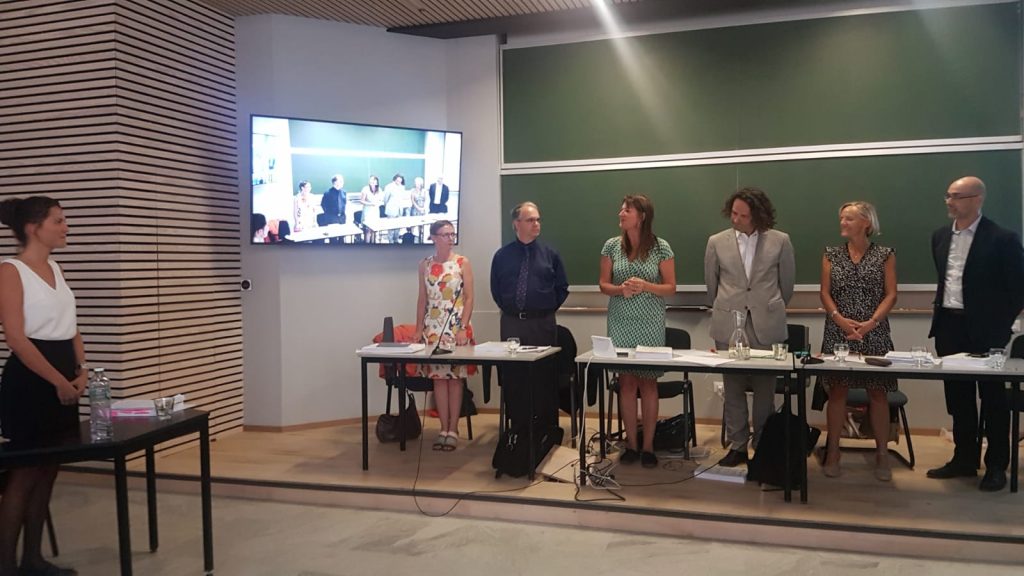Anne-Claire Marpeau, who defended her PhD in French Studies this past September, shares about her “atypical” approach to research and about her experience as a graduate student at UBC’s Department of French, Hispanic and Italian Studies.


Anne-Claire Marpeau, PhD Graduate in French Studies
“My thesis is atypical, since it incorporates both theoretical and pedagogical aspects. Perhaps my work will inspire other researchers who want to think outside of the box.”
Part 1: Research
Coming from France, where classic literature is an important part of the dominant culture and education, I always had the feeling that I was not totally free to think what I wanted about a book that I was assigned in class. This left me wondering:
Why are certain books taught in schools, while others are not? How do schools influence how students interpret these texts, and what underlying assumptions are at play?
To explore these questions further, my research examines how interpretations of Gustave Flaubert’s novel Madame Bovary have shifted over time. My thesis explores the « classicisation » process of the novel, which was threatened to be prohibited when it was first published in 1857, but progressively became mandatory in French schools and Literature departments at most Anglo-American universities.
Following Stanley Fish’s work on the mechanisms of interpretation and reception, I also study how the novel’s main character has been received by three interpretive communities: journalists and critics who were Flaubert’s contemporaries, French and Anglo-American academics between the 60s and 80s, and high school French students in 2016.
Insights
Students are not necessarily free to interpret texts as they wish, but are influenced by social codes and the expectations of their teachers.
Based on what schools make students read and how they ask them to read, I have identified a “double domination” at play: domination by an elitist culture and domination by a male culture.
Readers’ discourses are shaped by the drive for self-legitimation and by the universal « differential valency of genders » that Françoise Héritier conceptualized. Masculine reading is thought to be the template for « good » readings of the novel, while readers’ demeanours perceived as « feminine » are invalidated. This situation results in a specific framing of pedagogical expectations, which my thesis aims to decipher, along with their impact on French high school readers.
The main character, Emma Bovary, is commonly interpreted as a “bad” woman because she is constantly put under the male gaze. This is evident in all three interpretive communities I studied, but for different reasons:
Flaubert’s contemporaries:
Emma Bovary was seen as an adulterous wife, a bad mother and a sensual woman, who was often compared to a prostitute or a courtesan. During the trial of Madame Bovary, readers seemed both fascinated and disgusted by such a character.
French and Anglo-American critics of the 60s to 80s:
Emma Bovary was seen as a “bad reader” because she read with her heart and soul instead of in an analytical and critical way — the latter of which were considered male intellectual values. Even feminist critics of this period, who tried to rehabilitate Emma, felt the need to prove that Emma read like a male — in a critical, distanced and analytical way — in order to reconcile the idea of her as a “good reader.” What is perceived as “female reading” is constantly undermined in academic discourse.
High school students (2016):
The high school students I worked with, nearly all girls, unanimously disliked Emma Bovary because the character lacked independence and self-esteem, and also because she was not a good wife and mother. Emma and her tragic destiny seemed to echo the difficulties faced by young Western women with the need to reconcile the traditional imperative of a family life, the romantic imperative of maintaining a satisfying love and sex life, and the feminist imperative of building financial and emotional independence.
Impact
My thesis is atypical, since it incorporates both theoretical and pedagogical aspects. Perhaps my work will inspire other researchers who want to think outside of the box.
Literature is a social and cultural object, which has to be studied in relation to the people who make it, use it, and comment on it. My work belongs to the field of cultural studies in the sense that it uses interdisciplinary academic approaches to understand a cultural object and its effects on its readers. I have also tried to shift the epistemological viewpoint from which Madame Bovary has previously been examined in Western culture.
I drew from various disciplines (literature, history, social sciences, teaching theory and practices) and methodologies. I analyzed articles published in newspapers when the book was first published, as well as the judiciary speeches and texts written during the trial of Madame Bovary. I also analyzed academic papers and structuralist, post-structuralist, reader-response and feminist theories. I used literary close reading to understand the aesthetics of Flaubert and the reactions of his readers. Finally, I gathered and analyzed empirical data through distributing surveys, reading diaries and conducting interviews with a class of French high school students.


Part 2: Graduate Student Experience
I pursued graduate studies because I was passionate about literature and researching. I enrolled in the co-tutelle PhD program, which gives students the opportunity to work with two supervisors — one from UBC and one from a French partner institution (in my case, École normale supérieure de Lyon). I thought it would be a very unique experience to study partly in a French graduate school and partly in a North American university. The differences between both institutions were complementary.
Supervision
Prof. André Lamontagne was my graduate supervisor. He is an excellent scholar and gives very precise corrections, deepening my thinking by giving a lot of reading advice. He always answered me quickly and was truly supportive during the writing process of my thesis, which is always a long one.
Advice
Don’t pursue graduate school for the wrong reasons — because you think it’s necessary to get a good job, because it’s prestigious, or because you don’t know what else to do.
Ask yourself: “Do I have something to say about a particular topic? Is there a question I really want to ask?” Only if you are passionate about your research topic will you be able to put up with the workload, the pressure and the solitude that comes with writing a paper. You will find satisfactions along the way, including intellectual and personal discoveries, and the gratification of having pursued your project from beginning to end.
Career aspirations
My career goals are deeply intertwined with my research, as I have always wanted to explore literature in relation to teaching. It is precisely what literature research is missing in France, i.e. a link between university and high school, between literature analysis and its transmission.
I want to pursue secondary school teaching; I think it is a fantastic job! But I also want to pursue research, which you usually do while teaching at university. That means I will have to invent my career in order to find a way to do both. I followed my instincts when I decided to do atypical research, so I will follow my instincts as I try to create my own atypical career.
Blog
I created a blog with another young researcher called “Malaises dans la lecture,” in which we analyze commonly taught classical texts that contain violence and discrimination. We also provide pedagogical resources for teachers who would be interested in those issues. Everyone is free to submit an article or an account of a class experience, or to leave comments: https://malaises.hypotheses.org
Learn more about Anne-Claire Marpeau.


